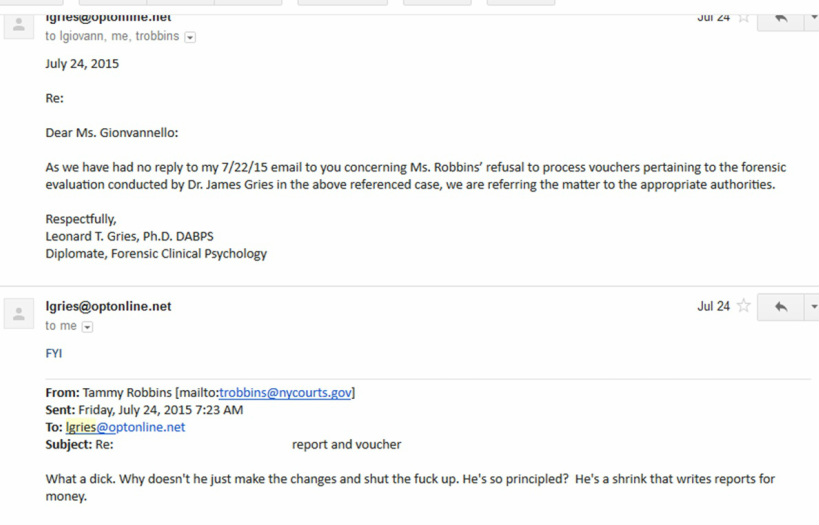Governor Cuomo has denied committing the acts of sexual harassment, non-consensual sexual contact and abuse of power that have been claimed to have occurred. He may be lying, but it is also possible that one or more of the complainants is either lying or distorting the true nature of what might have occurred. He deserves what every other American deserves under our constitution, the right to be regarded as innocent until such time that he has been shown to be guilty. What happened at the Capitol this past January 6th is but a more dramatic, violent version of what is happening when premature calls for resignation threaten to quash our centuries long instinct for fairness within carefully crafted democratic institutions. What almost happened on January 6th was nothing less than the crushing of our democracy; when due process is denied this too is a crushing of our democracy. What seems to have taken hold over the past couple of weeks is the latest incarnation of the cancel culture mentality which gained traction a few years ago as the remedy for the heretofore almost total ignoring of victims’ rights. The remedy of cancellation of the offensive party, whether it pertain to sexual, racist, xenophobic or other socially disapproved acts has been manifested by attempts at erasing the person from our memory and awareness. So we lose a Senator Franken for offenses that pale in comparison to those perpetrated openly and defiantly by the 45th president, simply because he is a member of a political party obsessed with avoiding looking hypocritical. We decide to never listen to recordings of Kate Smith singing God Bless America. We make plans to strip schools, roadways and bridges of such names as Thomas Jefferson and George Washington. Our default “corrective action” is to cast away rather than to rehabilitate. In so doing we attempt to erase from memory any redeemable qualities or accomplishments associated with those destined for the cancel culture garbage heap. In the tradition of American exceptionalism, we’ve become the world’s expert at institutionalizing criminal offenders of all stripes, particularly when they are persons of color. In the present circumstance, the call for Cuomo’s immediate departure may be of great negative consequence to the people of New York and the U.S. During the darkest early days of the pandemic, last spring, when New York was the world’s catastrophic epicenter, somebody needed to step up to give direction, hope and strength. Such leadership was MIA at the White House and in many governor mansions across the country. Cuomo’s daily briefings on the status of everything COVID, was viewed religiously by millions of New Yorkers, other Americans and people throughout the world. No, that doesn’t give him a pass on any sexual transgression he may have committed or excuse him from any role he might have played in issuing misleading reports about number of nursing home deaths, but it does recognize his past, present and future importance to us in at least completing the mission of ending the pandemic and returning to normalcy. The same skills and complex personality which eventuated in monumental leadership a year ago are still needed to ensure that New Yorkers continue to practice whatever the CDC recommends, to ensure we are all vaccinated this spring, and to implement a business – economic plan for restoring normalcy to our lives. Perhaps we will need another half year or longer before we arrive at the point where our need for a leader like Cuomo will not be so dire. By then, the investigation by Ms. James will have presumably provided us with the clarity needed to secure justice and due compensation for all, be it the victims or the falsely accused. At that point, Cuomo would either be exonerated, or found to be at fault and not worthy of completing his third term in office. It is then that resignation or impeachment would be most appropriate.
Those who viewed the HBO documentary series, Allen v. Farrow have had the opportunity of seeing what can happen when the investigatory process is sidetracked in the context of a case of child sexual abuse. In 1992 at least three investigations were initiated in response to revelations made by the 7 year-old daughter of Woody Allen and Mia Farrow, Dylan, that she had been sexually molested by her father. An investigation conducted at a children’s mental health facility in Connecticut failed to confirm the allegations, as did a parallel investigation conducted by The New York City Child Welfare Administration. A focus of the 4th and final series episode was on the criminal investigation conducted by Connecticut state attorney, Frank Maco, who, although believing there was enough evidence to conclude “probable cause,” decided to abort the process. He determined that subjecting Dylan to examination and cross-examination at trial would predictably have been traumatizing, thereby exacerbating the impact of any trauma already experienced via sexual victimization. We see a poignant conversation between Mr. Maco and Dylan, some 28 years later, who listens to his explanation about why the decision to drop the case was made. We also see Woody Allen at a press conference that took place when the charges were dropped. Dylan shows gratitude for what Mr. Maco did or didn’t do. She believed that Mr. Maco indeed acted in her best interest by shielding her from the experience of being questioned in Court, surrounded by the peering eyes of strangers and family, especially the bespectacled eyes of her father. Woody, despite being off the hook for criminal prosecution, expresses great displeasure with Mr. Maco, who essentially did a “Comey” twenty-three years before FBI Director James Comey announced he would not be filing charges against Hillary Clinton and then proceeded to excoriate her for mishandling of emails. In each instance the message delivered by law enforcement serves to permanently tarnish the reputation of the accused who is deprived of any opportunity for exoneration at trial.
A closer look at the events of the early 1990’s reveals that a much more just and emotionally healthy outcome could have been realized. Dylan could have been spared more than a quarter of a century of blaming herself for wrecking the family, for bringing shame to herself and family, for feeling socially ostracized, for feeling permanently damaged, for feeling that she must keep her true self hidden from everyone, which means to sacrifice authenticity. Her father need not have endured the protracted attack on his reputation and career, even if he were found guilty of a crime in 1993. In that instance, he would have had the opportunity to rehabilitate and to find a new path for living life without perpetually having to brace himself for the next attack. What Dylan needed back then was the opportunity to express whatever she endured within a suitable environment featuring support, and relative privacy. She would have been able to relay her personal narrative as much as she would have been capable of at age 7 or 8, and subsequently be in a better position to modify her narrative at later times in her development. Of significant importance, Dylan would have been relieved of the tremendous, toxic burden of secrecy as the core requirement of her childhood. To feel compelled to keep such secrets is to guarantee the eventuation of shame, accompanied by social avoidance, depression and diminished adaptive function. So what could have been done differently?
It turns out that Mr.Maco might have been able to go through with a trial and still afford Dylan a considerable amount of protection from the stressors of having to testify against her father in open court. He might have been able to take advantage of a decision handed down by the U.S. Supreme Court more than 2 years earlier on June 27th 1990. In the case of State of Maryland v. Craig, No. 89-478, the Court ruled that a child victim of abuse may be allowed to give her testimony via closed circuit television under certain circumstances, without that being a violation of the defendant’s 6th Amendment right to be able to confront his accuser.. It would have been Mr. Maco’s task to prove to the Court, with the assistance of expert testimony, that the child would be traumatized by having to testify in the defendant’s presence. It is conceivable that Dylan could have repeated the narrative that she previously told her therapist, probably with the extra reassurance of having the therapist nearby. Testimony could have been taken in the Judge’s chambers or in another setting much less austere than a courtroom. The swing vote in this 5 to 4 decision belonged to Justice Sandra Day O’Connor who recognized the “state’s interest in the physical and psychological well-being of child abuse victims… which may be sufficiently important , at least in some cases, a defendant’s right to face his accusers in court.” With such protection in place, Dylan’s participation in search of justice, backed by her mother, other close relatives and high ranking state officials would have catalyzed her much needed journey from victim to survivor to just another lovable, normal kid focusing on the task of mastering what other 7 and 8 year olds attempt to master. In his seeming benevolent gesture of “protecting” Dylan by short-circuiting the investigatory process, he inadvertently hindered and delayed her recovery well into adulthood. Only Mr. Maco knows whether there may have been an additional factor which convinced him to steer away from proceeding with charging Mr. Allen. In the majority of intra-familial sexual victimization cases, there is little if any physical evidence or eye-witnessed account of the alleged crimes. That makes it quite difficult to win convictions, which is not helpful to an official who might be facing the pressures of running for re-election. It is not known whether Mr. Maco was facing such pressures, nor did the documentary indicate whether a trained forensic mental health evaluator was enlisted by him to search for credible or exculpatory evidence. His commentary during the documentary implied that he served as his own evaluator, mentioning how daunting it was to elicit Dylan’s candor. An unspoken third possible reason for not pursuing the case to trial, is a paucity of clear, unambiguous, specific, disclosure, even though ample situational, incriminating evidence was found.
In sum, in a society such as ours, one which is supposed to nurture aspirational humanistic, democratic values, political or personal agenda which is disruptive and likely to derail due process in general and investigatory process in sexual victimization cases in particular, should be eschewed. Due process takes longer and may still fail to provide all the answers one is trying to answer, but it comes much closer to promoting the emotional health and dignity of everyone concerned. For the child sexual abuse victim or even the adult victim of childhood sexual abuse it may be regarded as a necessary component or means of realizing the most complete, enduring recovery attainable. What would have happened in 2018 if the investigatory process pertaining to allegations lodged against Brett Kavanaugh wasn’t sabotaged by the very effective, contrived tantrums of Senator Linsey Graham? A comparable question might be asked about the impact of Clarence Thomas’ contrived mini-tantrum which succeeded in distracting Senate Judiciary Committee Chairman Joe Biden from pursuing the investigatory process regarding sexual victimization allegations made against him to completion. When those in charge choose to prematurely abandon the investigatory process, it usually means that politics has taken over and that emotion-focused coping has replaced higher forms of intellectual problem-solving. For the most extreme recent example of the dangers of choosing emotion focused coping over problem-focused coping take another look at the videos taken at the Capitol on January 6, 2021.
Leonard T. Gries, Ph.D. The Ides of March, 2021


 RSS Feed
RSS Feed